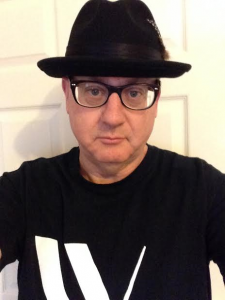Worth Living Ambassador Elliott Smith

My name is Elliott Smith. I’m a 46-year-old Network engineer from St. Paul, Minnesota, USA. I am Challenged with Bipolar Disorder, PTSD (combat related) Borderline Personality Disorder, Anxiety Disorder. I am driven to support and inspire others struggling or challenged with Mental Illness by leading a quality life in spite of my symptoms by discovering what’s effective in daily life and sharing my fight with others.
Warning: Elliott discusses suicide
Let’s get my credentials out-of-the-way first.
I am the proud owner of a seemingly accurate Bipolar I diagnosis. (Originally they hung a Bi-Polar. II label around my neck but I got upgraded along the way to type one!) I also have medical jackets out there that confirm that I am indeed challenged by Combat Related PTSD. (Sounds Macho, am I right?) I am an Operation Desert Shield/Storm Veteran from The US. Army’s Esteemed 82nd Airborne Division. I also have Borderline Personality Disorder (No big deal).
If you are familiar with Mental Illness or not you may recognize the names.(I like to call this group of diagnosis the Unholy Trinity of Mental Illness. They are bad just one at a time They are a Mother Fucker all packaged up together). I like to refer to them as the Hollywood disorders. Blockbusters like Rambo, Grand Torino, all focus on Veterans struggling with PTSD. We have seen the young female protagonist of Girl Interrupted struggling with the devastating and harmful effects of Borderline Personality Disorder. Who could forget the adorable presentation of Bipolar in Silver Linings Playbook? (Not I!)
Mental Illness makes a wonderful plot device. I loved Clint Eastwood in Gran Torino. But it makes for what can be a deviating reality for the person who has to live with it.
I have been institutionalized four times, about once a decade. The first time when I was 16 and a Junior in high school. I was intercepted midway through my Plan of what was my first Suicide attempt. The second institutionalization was shortly after my second suicide attempt. I was in the Army and recently back from the Gulf War and I was a fucking mess. I put a 9mm pistol to my head. I then pulled the trigger. I was unfamiliar with the operation of the pistol (It was not mine but my roommates). I thought I could pull the trigger and it would fire, when in fact you had to pull the hammer back to fire the first shot. This fact was the only thing that saved my life. I reported my attempted suicide to my squad leader, he told me to “walk it off.” (FTA) The third visit to the locked area of the hospital was after punching myself in the face as hard as I could. I was trying to somehow convey my love to partner at the time with this activity. (Yay BPD!). The last visit was a nice locked Ward in the VA hospital after I tried to hang myself in a locked bathroom while my wife at the time panicked to get into the room to save me. (She succeeded obviously) It was kinda a DICK move I know but at the time it seemed like my only realistic option. It seemed like my only real choice.
I have given you a glimpse into my darkness. Real or imagined, at multiple points in my life I fell so low, so beaten, that taking a dirt nap was the only thing I could fathom as being capable of giving me relief. I wanted relief. I longed for relief. No matter how good things got. (My children, my music, my many successes) I was always waiting for the other shoe to drop. Waiting for the bottom to drop out. Waiting to have an “episode” as I started calling them. That was my Mental Illness reality. It didn’t matter what I was doing successfully at the moment I was always terrified that the demon in me would surface and fuck everything up again. Shatter all progress. Return me to the pile of shit I convinced myself I was.
Then a funny thing happened. I couldn’t tell you how it came about or why I did it. But I discovered that I was eligible for Veterans benefits through the Veterans administration. Then somehow I got my shit together enough to file for disability for my hearing and PTSD. I was awarded 60% disability for PTSD and hearing problems.
The main thing this interaction with the VA provided me with was a mental health team invested in my recovery. Free of charge. Access to the medications I could not afford before I got into the VA system. Free of charge.
I was unemployed. I was technically homeless. Mentally shattered, sick and tired of my symptoms driven life. I knew there was no cure but maybe there was a workaround?
Since 2010 I have been in active therapy at time up to three days a week for three hours for DBT (Google it) I had a break down. I got back up. I got into a vocational rehabilitation program through the VA. Learned a new trade. I have held a Job for two years without interruption.(Fuck you, that is huge for someone with symptoms as severe as mine) Met an understanding and beautiful woman to love and who loves me. Today I have an amazing life.
I found a work around!
What I finally found that was effective for me were the things that I was told to do all along.(Who knew?)
Sleep.
Take my meds.
Keep my appointments.
Don’t stop taking my meds when I feel better.
Eat.
Bathe.
Ask for help.
Be in the now.
Take it as it comes.
Exercise.
Accept.
Prepare.
Create Supports.
Use the supports I created.
Act not think.
FIGHT!
I also came to understand some hard truths.
My life will never be simple or easy. I will always be this way, I will always have the illnesses. The world will always have their fucked up stigma but that’s on them not on me. If I am confused about what I am thinking or feeling talk about it immediately. If my symptoms are trying to destroy the quality of life I have built, I take steps to minimize the damage. I remembered how to fight! Every day, I fight that thing inside. I do and I grow. I share and I strive. That thing inside me never stops trying to kill me. I fight back as if my life depends on it! (It does) It may sleep or rest but it is waiting for me so. I fight! I may fall down again. I may lose my shit and find myself back in the embrace of a chubby orderly while Nurse Ratchet plugs me in the ass cheek with a sedative again. (True story) That could happen. But I will go down swinging. I will stand right back up to fight again and again.
Stay tuned more to come.








